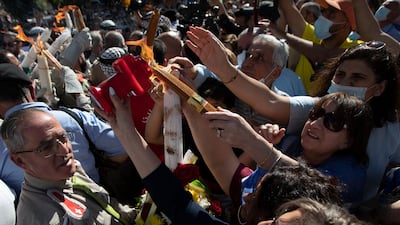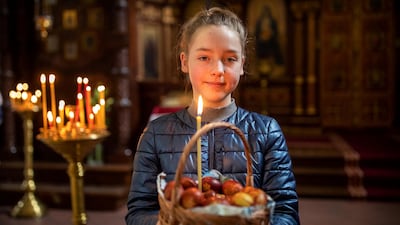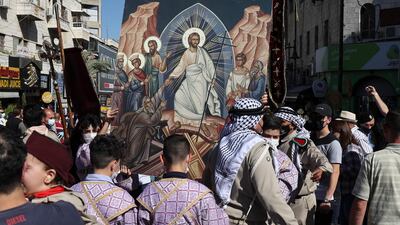Orthodox Christians celebrated Easter on Saturday with the spectacular Holy Fire ceremony in Jerusalem's Old City, a year after religious life was turned upside down by the coronavirus pandemic.
About 2,500 worshippers gathered at the Church of the Holy Sepulchre to receive the flame they believe appears miraculously from Jesus' tomb each year.
Crowds tussled to light their candles, before the flame was taken out of the church to be received by the community and flown to Orthodox Christians around the world.
Although the centuries-old tradition went ahead as planned inside the church, Israeli police faced criticism for restricting access to the Old City.
“Since the morning, the Israeli police have closed the entrances to the Old City and prevented families from entering the Church of the Holy Sepulchre,” said Adeeb Jawad Joudeh Al Husseini, whose family hold the keys to the church.
“Jerusalem is sad. Hundreds of people were unable to enter the church."
A police spokesman said officers "had to act to prevent others from entering, due to the safety of the people following the Covid-19 guidelines."
The restrictions were also criticised by Arab-Israeli legislator Sami Abu Shahadeh, who tweeted: “We condemn in the strongest terms the disruptions made by Israeli forces."
Last year the ceremony was strictly curtailed because it came weeks after the first coronavirus outbreaks in the city.
Only eight priests from the four Orthodox denominations attended, while other clergy waited outside to carry oil lamps to cars at the edge of the Old City.
At a time when most planes were grounded because of the pandemic, private jets were granted permission to fly the flame to countries such as Romania and Russia.
This year’s service was limited to vaccinated worshippers, while foreign tourists remain absent from the Old City because of border controls imposed during the pandemic.
Israel plans to allow a limited number of tour groups to visit this month, although it remains unclear whether they will be allowed to see holy sites in Bethlehem, which is governed by the Palestinian Authority.
Worshippers returned to Jerusalem's holy sites in greater numbers in recent weeks, as Israel ended its third nationwide lockdown after vaccinating more than half the population.
In Jerusalem's Old City, which has been occupied by Israel since 1967, Palestinians and Israelis can be vaccinated.
Meanwhile, in the occupied West Bank, Israeli settlers and Palestinians with Israeli work permits can receive doses.
A separate programme led by the Palestinian Authority has vaccinated about 10 per cent of Palestinians in the West Bank.









